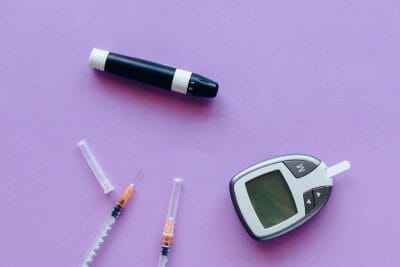When it comes to your health, you cannot be careful enough. Once your health starts declining, recovery becomes difficult. Therefore, before you hit this point, you must start looking after yourself better. This is especially true when dealing with a chronic health condition like diabetes.
According to the CDC, about 37 million Americans have diabetes. But what exactly is this health condition?
Diabetes is a disease that occurs when your blood sugar is far higher than your average threshold.
Generally, when your glucose levels are high, your body produces the hormone insulin to counteract the effects. However, during diabetes, your body either fails to make enough insulin or fails to use it properly. As a result, an influx of glucose stays in your blood without reaching your cells, putting you at risk for kidney, nerve, and heart damage.
So, how do you know if you’re at risk of getting diabetes? Here’s how you can recognize the warning signs.
How To You Detect Diabetes?

Diabetes is a severe illness, and you shouldn’t take it lightly. In Alabama alone, about 13.9% of the adult population is diagnosed with diabetes. According to the Alabama Department of Public Health and the Alabama Diabetes Association, about 600,000 people have diabetes in Alabama.
Therefore, if you hail from this state and live in any city here, such as Cullman, and are struggling with your health, you need to get yourself checked. Diabetes is gradually becoming a global epidemic, and the only way you can be sure you don’t have it is by checking your blood glucose levels.
To do this, you need to purchase a blood glucose meter from a pharmacy in Cullman AL, to determine where you stand. A healthy body’s average blood sugar levels are 90 to 100 mg/dL while fasting. But if your blood sugar is from 100 to 125 mg/dL, you may be prediabetic. If the levels continue to increase and you hit 126 mg/dL, you have diabetes.
What Are the Signs of Diabetes?
Before you get any disease, there are specific warning signs that should alarm you about your health.
1. Increased Hunger and Fatigue
When you eat, your body metabolizes energy from the glucose in your meals. However, your cells need insulin to take in glucose. But, if you have diabetes, your body may produce insufficient insulin, or your cells may resist insulin, preventing glucose from entering them. As a result, no matter how much you eat, you may continue feeling hungry and weak. This can lead to you eating more than you should, which may cause other problems like an immense gain in weight and possible obesity.
2. Frequent Urination
The average person pees about 800 to 2,000 milliliters a day. In other words, you can go to the bathroom between four to seven times daily. However, if you have diabetes, you will go far more often. The only plausible explanation for this is the amount of glucose in your blood. Usually, when there is too much glucose in the blood, it gets reabsorbed by your kidneys and used up by your metabolism.
On the other hand, when you’re dealing with diabetes, your body cannot deal with a high glucose level, and your kidneys cannot keep up. As a result, you will produce more urine and feel extremely thirsty throughout the day.
3. Blurred Vision
The fluctuating levels of water in your body can impact your vision. Your lenses will respond to this change and swell up, causing your vision to blur. In extreme cases, you may end up with Diabetic retinopathy. This is a severe condition in which you may become blind. High blood sugar damages the blood vessels in your eyes and impacts the retina. When your blood vessels are damaged, they can swell and leak. Initially, you may experience blurry vision; as your eyesight gets weaker and your blood vessels struggle to heal, eventually, blood stops flowing through them.
4. Yeast Infections
One of the symptoms of type 2 diabetes is a yeast infection. The influx of glucose, coupled with the ideal conditions around your skin, fingers, toes, breasts, and genitals, gives the yeast the room to grow. Yeast infections can be painful, and if it is in your genitals, you may feel a burning sensation when you urinate.
Final Thoughts
Diabetes is a chronic health condition. This means once you get this disease, you cannot cure it but only try to control it. You may start experiencing specific symptoms indicating you have diabetes. These include increased hunger, fatigue, and urination. Your vision may also get impacted, making it hard to see and, in extreme situations, lead to permanent blindness.
Hence, you need to contact a medical practitioner if you have been having these symptoms. If you’re at risk for diabetes, you can still prevent the condition from escalating.
